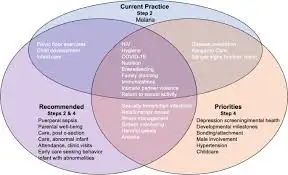
Pregnancy is a crucial time in a woman's life, requiring special attention to nutrition and health. Essential vitamins play a significant role in ensuring both the mother's wellbeing and the baby's healthy development. Nutrients like folic acid, iron, calcium, and DHA are vital during this period, as they contribute to critical growth stages. It is important for expectant mothers to incorporate these vitamins into their daily diets to support a healthy pregnancy journey. Folic acid is perhaps the most critical vitamin for pregnant women. It is a B vitamin that helps in the formation of the neural tube, which develops into the baby's brain and spinal cord. Adequate levels of folic acid can significantly reduce the risks of neural tube defects. Pregnant women should aim to consume at least 400 to 800 micrograms of folic acid daily. Sources rich in folic acid include dark leafy greens, beans, fortified cereals, and citrus fruits. Additionally, prenatal vitamins often contain this essential nutrient, making it easier for expectant mothers to meet their daily requirements. Iron is another vital nutrient during pregnancy, as it helps in the production of hemoglobin, which carries oxygen to both the mother and the developing baby. Pregnant women need about 27 milligrams of iron per day. A deficiency in iron can lead to anemia, resulting in fatigue and complications during delivery. Good dietary sources of iron include lean meats, spinach, legumes, and quinoa. Pairing iron-rich foods with vitamin C sources, such as oranges and strawberries, can enhance iron absorption, making it even more effective. Calcium is crucial for building strong bones and teeth for the growing fetus. During pregnancy, it is recommended that women consume about 1,000 milligrams of calcium daily. If adequate calcium is not provided through the diet, the body will draw calcium from the mother's bones, potentially leading to long-term health issues. Dairy products like milk, cheese, and yogurt are excellent sources of calcium. For those who are lactose intolerant or prefer non-dairy options, fortified plant-based milks and leafy greens can also supply necessary calcium levels. DHA, or docosahexaenoic acid, is an omega-3 fatty acid that is vital for the development of the baby's brain and eyes. Research suggests that DHA supplementation during pregnancy is linked to improved cognitive functions in children. Expectant mothers should aim to include 200 to 300 milligrams of DHA daily. Fatty fish, such as salmon and sardines, are rich sources of DHA, while vegan options include algae-based supplements. It's important to choose sustainable seafood options to avoid exposure to toxins. A balanced diet is essential for meeting the nutritional needs of pregnant women. It should include a variety of food groups to ensure an adequate intake of essential vitamins and minerals. Pregnant women should focus on whole foods, such as fruits, vegetables, whole grains, lean proteins, and healthy fats. Meal planning can reduce the risk of nutrient deficiencies and help expectant mothers to stay on track. They should also consider consulting with a healthcare provider or a registered dietitian to tailor their diets according to individual needs. Staying hydrated is often overlooked but is equally important during pregnancy. Proper hydration supports overall health, aids digestion, and helps maintain amniotic fluid levels. Pregnant women should aim to drink at least 8 to 10 cups of fluid daily, focusing on water as the primary source. Herbal teas and infused waters can be refreshing alternatives. Limiting caffeine and avoiding high-sugar beverages can also contribute to better hydration levels. In addition to ensuring adequate vitamin and nutrient intake, pregnant women should also be vigilant about avoiding harmful substances. This includes limiting caffeine intake, avoiding alcohol, and steering clear of certain fish high in mercury. Processed foods that are high in sugars and unhealthy fats should also be minimized. Proper food safety practices, such as washing fruits and vegetables thoroughly and cooking meats to the appropriate temperatures, are essential for preventing foodborne illnesses. Regular check-ups with a healthcare provider are important during pregnancy. These appointments often include monitoring vitamin levels and overall health. Blood tests can determine if any deficiencies exist, allowing for prompt interventions through dietary changes or supplements. Such proactive measures can help in maintaining optimal health for both mother and baby throughout the pregnancy journey. Folic acid can be found in leafy greens, beans, lentils, fortified cereals, and citrus fruits. Taking a prenatal vitamin with folic acid is also recommended. To ensure adequate iron intake, focus on consuming red meat, poultry, fish, beans, and spinach. Pairing these with vitamin C-rich foods can enhance absorption. While a balanced diet should provide most nutrients, prenatal vitamins can help fill any gaps in nutrition. Always consult with a healthcare provider before starting any supplements.Essential Vitamins for a Healthy Pregnancy Journey
Understanding the Importance of Vitamins
Folic Acid: A Key Player
Iron: Building Blocks for Blood
Calcium: Strong Foundations
DHA: Essential for Brain Development
Creating a Balanced Diet
Planning Nutrient-Rich Meals
Hydration: A Vital Component
Avoiding Harmful Substances
Monitoring Vitamin Levels
FAQs About Essential Vitamins and Pregnancy
What are the best sources of folic acid during pregnancy?
How can I ensure I get enough iron during my pregnancy?
Is it necessary to take vitamin supplements during pregnancy?